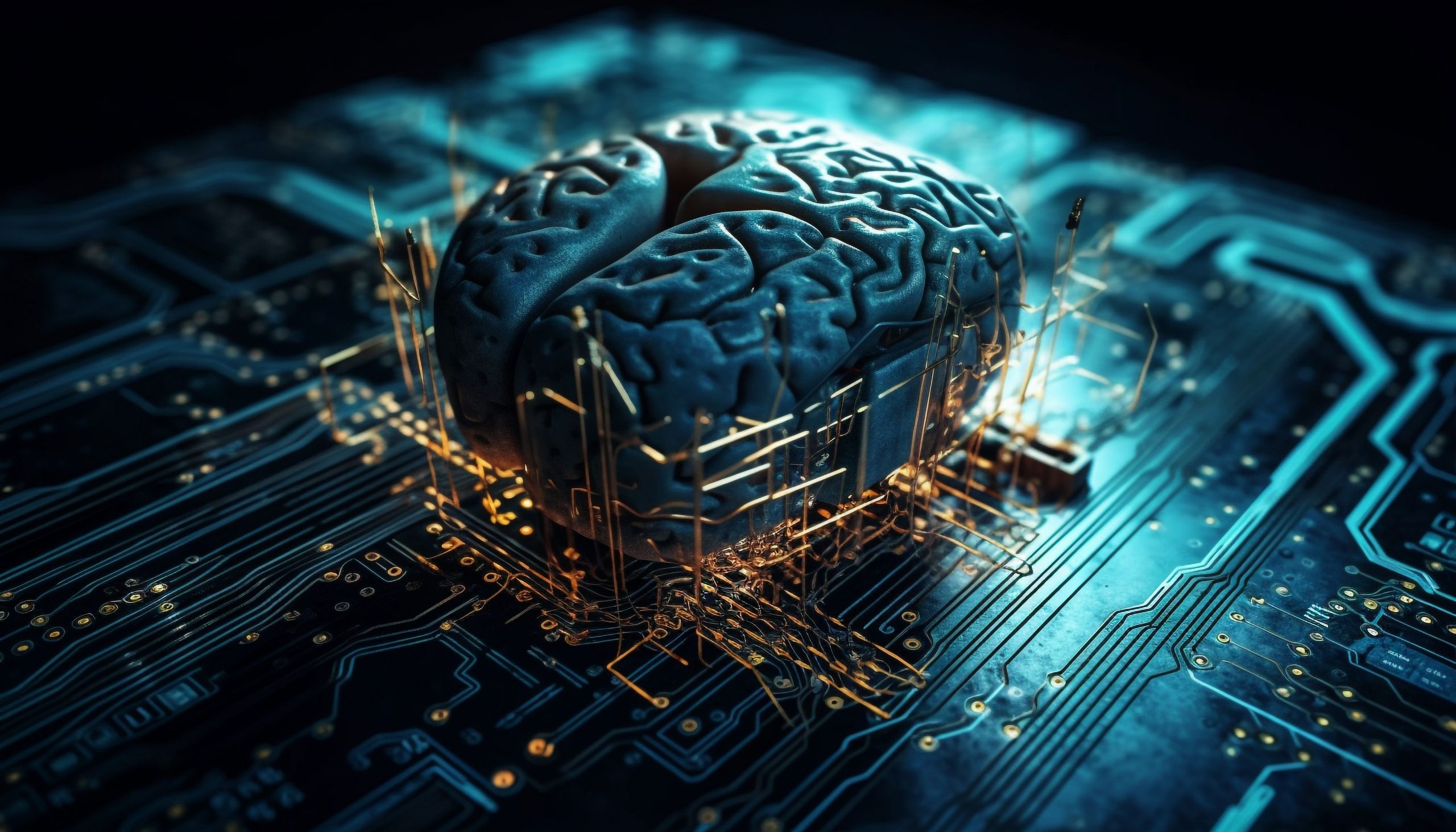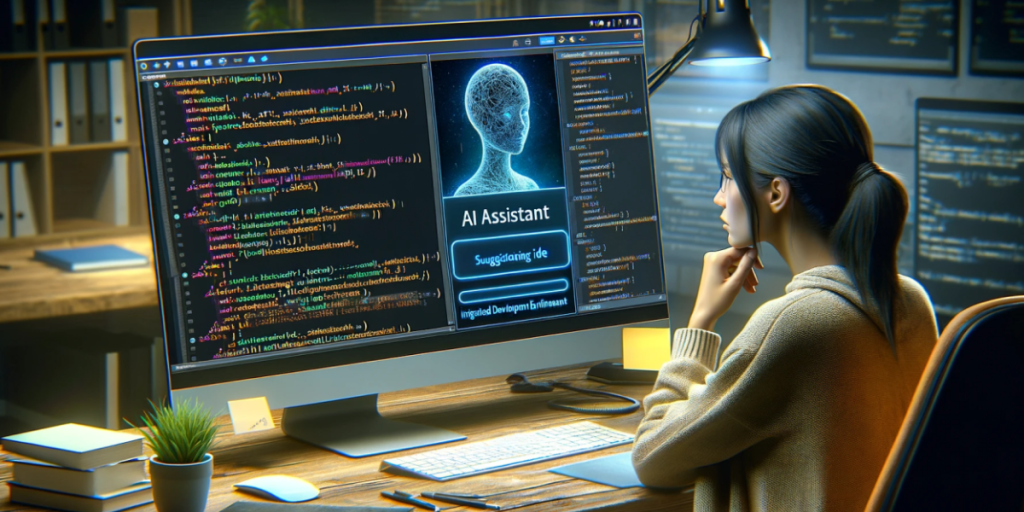In a world of endless possibilities, generative Artificial Intelligence applications’ widespread use and accelerated availability offer programmers an enthralling array of new options. Applications range from making art to writing code. Software growth has surpassed consumer technology trends over the last ten years. Our working methods are changing fast, and the realm of software development isn’t any different. Many developers are now using routine AI programming tools.
Within the software field, AI coding tools assist AI Development Company at different levels of the development process. They can create boilerplate code and provide advice, allowing developers to lay the basis for their software swiftly. AI programming platforms also provide unit testing and debugging, ensuring you can deliver efficient and reliable software to your customers.
Let’s discover which AI generators are the best for creating great code using artificial intelligence.
What Is AI Code Generation?
AI code generation is the process of using software programs that, through artificial intelligence, the machine learns computer-generated codes. Instead of manually typing each line of code, users provide the AI tool with an explanation of what they wish the code to achieve. The AI tool will then use sophisticated Language Models (LLMs) and Generative AI methods to generate or suggest code in response to input provided by the user providing the required functionality. Although the code it generates might not be ideal, it gives developers the foundation they need to build on, making it easier and faster to create codes.
AI Code generator applications use artificial intelligence algorithms, natural processing of language (NLP), and machine-learning algorithms to develop automated code creation processes. One of the most apparent benefits is that they offer new ways to automate programming, enhance the development process, and increase a human programmer’s development performance. The AI software created by these programs could help simplify the process of integration easier.
How Does AI Code Generation Work?
AI code generation is based on ML algorithms trained on the existing source code, often drawn from open-source projects. The process works using three principal ways:
- Developers write the code, and then the AI tool tries to autocomplete it based on patterns it has learned from its training data.
- Developers communicate their intentions using natural language input, which prompts the AI software to create codes that align with their goals.
- Developers have direct conversations with AI via chat, which is AI through a chat interface. Making specific requests or commands to fix bugs demonstrates that AI can converse with people—AI technology.
Generative AI to code is possible due to the modern advancements of Large Language Model (LLM) techniques and Natural Language Processing (NLP). It utilizes Deep Learning (DL) algorithms and vast Neural Networks that train these models with various data sources, including public code repositories managed by open-source projects.
The Benefits Of AI Code Generators
Let’s look at the advantages of how using AI code-generator tools can help AI Development Companies accelerate the development process.
Increased Productivity
AI software’s most significant advantage is its capacity to increase productivity by automating repetitive and lengthy programming jobs. Software developers can use these tools to produce boilerplate code, change existing codebases to better form, and develop new capabilities faster. Thus, freeing time to focus on higher-level problem-solving and developing new features.
Faster Development Cycles
AI code generators can dramatically reduce development time by automating code generation. This allows teams to develop faster and bring products to market quickly. This is especially beneficial in fast-paced industries, where speed-to-market is essential to maintaining the competitive edge.
Enhanced Code Quality
AI code generators can aid in improving code quality by enforcing code standards, recognizing potential mistakes or flaws, and encouraging the best techniques. By generating consistently well-structured, consistent code, they can decrease the chance of bugs, improve maintenance, and improve the collaboration between developers.
Accessibility And Inclusivity
AI code generators make coding more accessible to those with different levels of programming expertise. They can reduce the entry barrier for developers interested in learning and allow those who aren’t technical stakeholders to be part of the development process. AI code generators also promote inclusiveness and diversity in the technology sector.
Learning And Skill Development
Although AI code generators can automate routine tasks, they also allow learning and improving skills. Developers can analyze the codes generated through these programs and benefit from algorithms’ decision-making processing. Also gain knowledge about the best practices with the help of AI Consulting Firms for programming and code patterns. This will ultimately improve the proficiency of their programmers.
Top AI Code Generator Tools For Programmers
The introduction of AI-powered code generators has dramatically reduced and increased the efficiency of programmers’ coding processes. Code generators use machine learning and artificial intelligence to generate codes, components, and complete applications. In light of their popularity and ease of accessibility, we’ve selected some of the best AI code generators that should be explored:
GitHub Copilot
Created by GitHub and OpenAI, GitHub Copilot represents the next step in AI-powered programming aids. It functions as a virtual programmer that assists programmers in creating superior code faster. This is accomplished by suggesting a complete block of code or lines when you write. But the GitHub Copilot does not just repeat the codes it’s been educated on. Instead, it learns and adapts to every developer’s distinct style of programming. Its recommendations become more personalized and precise over time, which makes it an extremely effective programming partner.
OpenAI Codex
The most well-known AI coder tool currently available is OpenAI Codex, a powerful AI code generator. It was developed with considerable code and built from its LLMs (GPT-3 and GPT-4) by OpenAI. Naturally, it incorporates the capability to comprehend and write codes. OpenAI Codex promises to create programs using more than 12 languages, including Go, TypeScript, Perl, PHP, BASH, Ruby, JavaScript, and Swift. The algorithm was developed from trillions of lines of freely accessible code on sites like GitHub repository, making it an incredibly versatile and powerful instrument for programmers and developers.
Codeium
Codeium is sophisticated AI-powered software designed to help coders with various coding tasks. It offers many functions, including code fixing and generation; however, its best-known characteristic is its autocomplete function. The standout feature analyzes the users’ existing source code. It can discern the subtleties of coding styles and the requirements specific to the project. After studying this, Codeium intelligently suggests or automatically generates new codes. These suggestions aren’t only syntax-correct but are also designed to be seamless with the application’s overall design and functionality.
Additionally, the autocomplete feature of Codeium improves efficiency and reduces the chance of errors being made. The autocomplete feature streamlines development in a way that reduces time spent doing routine tasks. This can be particularly effective when working on larger-scale projects where keeping on task and adhering strictly to project rules are paramount. The best part is that Codeium offers models that have been trained for 70+ languages as well as 40+ editors.
Tabnine
Tabnine is an effective AI code generator on the internet created by Codota. This tool uses machine learning methods to determine and suggest completion, making code faster, more effective, and less error-resistant. Because it utilizes deep learning techniques to give precise code suggestions, This is a vital source for any developer’s toolbox. How you write provides personalized recommendations, and your code gets indexed. Its advanced AI capabilities provide features like automated code completion, automatic generation of tests, syntax highlighting, and interfaces with popular IDEs.
Cogram
Cogram is a start-up from Berlin’s YCombinator incubator that creates codes for data scientists and Python programmers using Jupyter Notebooks and SQL queries. Data scientists can create English-language queries converted to sophisticated SQL queries that include groups and joins. Cogram is compatible with MySQL, SQLite, PostgreSQL, and Amazon Redshift. Python and Julia developers can use Cogram with Jupyter Notebooks to generate codes automatically. In response to the comments, Cogram can provide context-specific instructions for a specific task. It is not uncommon for data scientists to utilize Python modules such as Matplotlib, Plotly, or Seaborn to make visualizations.
CodeT5
CodeT5 provides a technology that lets developers create AI-generated codes for their specific initiatives. It’s a cost-free AI code generator on the internet that developers can easily access worldwide. It analyzes the requirements of projects using the natural process of language (NLP) and machine-learning techniques to create the highest quality code possible using models that have been trained. It can complete code that is not fully completed or summarize it, as well as convert it to various programming languages.
ChatGPT (GPT-3/4)
OpenAI, created by OpenAI, conceived the idea. The AI chatbot ChatGPT has gained much popularity as various ways to use it have become a significant trend. Using transformers, ChatGPT can broaden its ability to perceive the environment and be like a human. ChatGPT has an excellent range of actions and may even create codes. However, as with other AI software, ChatGPT code might include problems, make it challenging to keep up-to-date, and have security weaknesses such as security flaws. In the past, AI code tools were far from replacing human coders, although they may assist in speeding down the process.
GPT-4, the latest OpenAI AI model, is multimodal software that excels at programming. It comprehends and clarifies how to write code and can outperform the existing models for Python programming tasks. While it can handle complicated tasks, it does have issues with reasoning errors and vulnerability to security within the code it creates.
AlphaCode
Another code generator based on AI is DeepMind’s Google-backed AlphaCode, which provides developers with access to codes from various language libraries. AlphaCode developers can use the thousands of library templates already in place, allowing them to access APIs from third parties quickly and efficiently. AlphaCode is not yet open for public use.
Polycoder
Polycoder is among the first open-source Artificial Intelligence powered code generators, focusing on creating code specifically for programming needs. PolyCode is an effective AI code generator available for download through GitHub. It employs sophisticated algorithms for natural language processing and code creation. The available datasets on GitHub include more than 200GB. Furthermore, the models are constantly updated with the aid of robust hardware.
GhostWriter Replit
Replit GhostWriter, developed by Replit, is a robust AI generator that helps developers write high-quality, efficient code. GhostWriter stands out for its ability to produce boilerplate code while the programmer creates it automatically. It saves time searching for syntax issues and creating boilerplate code. The IDE is well-known as a browser-based IDE that supports native hosting and co-coding in documents.
AskCodi
AskCodi is an extensive toolkit that uses AI to help developers and programmers develop faster. There are various options, from producing code using various languages to creating documentation with existing code. It can be used for every stage of development, starting with documentation creation and creating codes! You can also develop SQL queries completely from scratch and quickly create tests. The various features are designed to increase the efficiency of workflows with AI’s help to help developers improve their processes and deliver faster.
Seek
Seek can be described as an AI code generator providing developers with different code layouts. It is based on the idea of “code snippets,” which allows developers to use templates already in place and modify them according to the needs of their projects. It’s a great Artificial Intelligence code writer for developers and data analysts who want to create instantaneous SQL queries without writing the code manually. The Seek approach allows more flexibility when writing SQL code to train data.
Codiga
Codiga software analyzes static code and can be used with various platforms, IDEs, and other applications. It is an application focused on security and allows immediate automatic code corrections. This approach ensures your program is as reliable and safe as possible. The platform is compatible with the most popular languages, such as YML, JavaScript, types, Ruby, and Java. This can assist you with analyzing existing code you or your team created; however, you require assistance creating new codes. If you are manufacturing a product, it’s much quicker and much more efficient.
AI2SQL
AI2SQL is a code generation tool that is an effective tool within the field of artificial intelligence. It is specifically developed to convert naturally asked questions in natural language to SQL statements. AI2SQL eliminates the need for an extensive knowledge of SQL syntax through a simple process of translating natural language to SQL, which makes databases more accessible to a larger public. Python programmers or data scientists, as well as business executives who need to look into databases for insight, can benefit from the power of this unique AI software.
Visual Studio IntelliCode
Microsoft’s IntelliCode is a program that enables AI-assisted code. It’s pre-integrated into Visual Studio, a Microsoft IDE. It works with Java, Python, JavaScript, and TypeScript within Visual Studio Code and is compatible with C# and XAML in Visual Studio. The AI software for code completion was developed based on the code from 500,000 open-source projects from GitHub, which have at least 100 stars. Ultimately, it will provide more informed recommendations based on the situation and current codes.
Cody By Sourcegraph
The Cody is an integrated AI programming helper created to aid in “Artificial Intelligence code generation naturally.” Cody is a pro at finding the source, translating, and developing code using Large Language Models (LLMs), Sourcegraph search, and Sourcegraph expertise in code. Through these tools, Cody drastically reduces the necessity of using manual tools, allowing humans to remain focused and efficient. Cody’s most distinctive feature is its inherent capacity to recognize the context within which code is generated, allowing it to offer valuable and accurate comments and feedback.
Wing Python IDE Pro
The product was developed through Wingware. Wing IDE is the Python-specific setup of software that integrates the editing, navigation of code, and debugging tools required for Code and Test Software applications. It provides various features, including an automated, intelligent editor, refactoring, multi-selection, and code Snippets, making coding more straightforward and faster.
Bard (Google)
Bard assists with software development and programming tasks like programming, debugging, and code explanation. Its capabilities are available for over 20 programming languages, such as C++, Go, Java, Javascript, Python, and Typescript. Exporting Python codes to Google Colab is also possible without copying and pasting. Bard also assists with creating functions in Google Sheets.
Claude 2 & 3 (Anthropic)
Claude 2 is the latest natural language AI model introduced by Anthropic, an organization founded by Dario Amodei, who was previously with OpenAI. The new version is designed to provide greater output and input durations and performs better than the earlier version. Users can input as much as 100K tokens per request, meaning Claude can work with many pages of documents. Claude 2 scored 71.2%, up from 56.0 percent on Codex HumanEval, a Python testing of coding.
The Challenges Of AI Code Generation
However, adopting AI Code Generation currently comes with a few difficulties. This raises concerns concerning the accuracy and validity of the code generated by ChatGPT and highlights possible risks that could arise from their widespread usage. Like any technology that is still in its infant stages, the concerns are centered around questions that include:
Code Quality And Reliability
Do you thing AI code are reliable? Studies have proven that, while generally trustworthy, Artificial Intelligence assistants can sometimes create insecure or unstable code, highlighting the necessity of thorough code review.
Maintainability
Generative AI may produce more complex codes than necessary to fulfill developers’ requirements or provide functionality. Over-engineering may cause unneeded abstractions, many layers of code, or complicated algorithms. The complexity of codes can result in future maintenance issues and make debugging and collaboration difficult.
Risk Of Technical Debt
Generative AI models can prioritize the generation of syntax-correct code but aren’t necessarily designed for efficiency, quality, and maintainability. The result is programming that is difficult to comprehend, modify, or expand, leading to increased technical debt.
Control Issues
Sure, developers are concerned that over-relying on Artificial Intelligence assistance could reduce their programming skills and knowledge. The secret is to view AI as an effective tool, not an alternative to human judgment or critical thinking.
Mitigating Risks Of AI Code Generator Tools
To maximize the advantages of AI code generators and to minimize possible risks, programmers, as well as organizations, should follow several top practices:
- Use supervised learning to build Artificial Intelligence models with high-quality, varied datasets. Validate the code’s results to guarantee accuracy, security, and reliability.
- Human oversight and involvement during creating code Developers can review modifications, edit, and confirm AI-generated codes as required.
- Engaging developers in AI code generators can create a culture of constant improvement and learning. They can learn from their outputs and help improve and develop AI algorithms as they progress.
- Establish ethics-based guidelines and governance structures that allow responsible AI usage when developing software, ensuring the algorithms have fair integrity, transparency, and accountability.
- Balance task automation and human touch by utilizing AI code generators to simplify regular functions. This will allow developers to think critically and solve problems together.
In Summary
The advent and development of AI are changing the world of technology. AI-generated code is a fascinating and useful device for software developers and engineers. It is possible that they have impacted work, but they know their value and have figured out how to incorporate the tool into their jobs to facilitate their work.
The significance of AI in software and coding development is expanding rapidly. Artificial Intelligence-powered software generators are setting the way by offering robust, efficient, and understandable tools for experienced developers and newcomers alike. They don’t just accelerate the writing process but also make it easily accessible to a broader public, increasing the capability of both organizations and individuals. AI-powered software has provided new avenues and opportunities, from creating fully functional eCommerce websites to converting audio commands into codes.
In short, AI is transforming how you write computer code. Think about these AI code generators, and you might find an application that dramatically improves your coding efficiency while broadening your development possibilities.

























